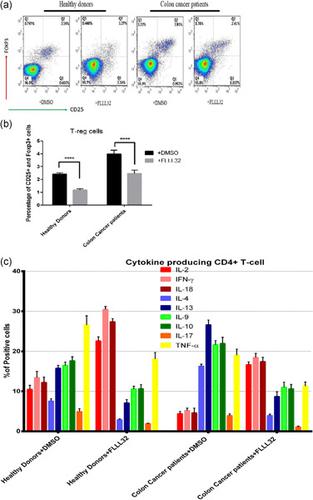当前位置:
X-MOL 学术
›
J. Cell. Physiol.
›
论文详情
Our official English website, www.x-mol.net, welcomes your
feedback! (Note: you will need to create a separate account there.)
STAT3 inhibition reduced PD-L1 expression and enhanced antitumor immune responses.
Journal of Cellular Physiology ( IF 4.5 ) Pub Date : 2020-05-13 , DOI: 10.1002/jcp.29750 Amirhossein Jahangiri 1 , Maryam Dadmanesh 2 , Khodayar Ghorban 1
Journal of Cellular Physiology ( IF 4.5 ) Pub Date : 2020-05-13 , DOI: 10.1002/jcp.29750 Amirhossein Jahangiri 1 , Maryam Dadmanesh 2 , Khodayar Ghorban 1
Affiliation

|
Colon cancer is one the most common diagnosed cancers in America and Europe. Signal transducer and activator of transcription 3 (STAT3) in colon cancer is associated with proliferation of the tumor cells and suppression of immune responses. STAT3 activation upregulates the transcription of many suppressor genes, including programmed death‐ligand 1 (PD‐L1). This study was aimed to investigate the effect of STAT3 inhibition in a colon cancer cell line, HCT‐15, and particularly in presence of samples obtained from the patients suffering from colon cancer. In this project, the expression of PD‐L1 and apoptosis‐related proteins were assessed following STAT3 inhibition, using FLLL32, in HCT‐15 cells. To evaluate the effects of STAT3 inhibition on immune response, lymphocytes from 20 men with Stage III colon cancer and 20 healthy donors were cocultured with HCT‐15 cells in presence or absence of STAT3 inhibitor. Then, T regulatory (T‐reg) cell evaluation and intracellular cytokine staining (ICS) were performed using flowcytometry to assess the T‐reg and T helper (Th) subset cytokines following STAT3 inhibition. STAT3 inhibition suppressed PD‐L1 expression and induced apoptosis in HCT‐15 cells. The population of T‐reg cells in patients with colon cancer significantly decreased after treatment with STAT3 inhibitor. ICS revealed that STAT3 inhibition promotes Th1 protective immune responses. These findings suggest that STAT3 inhibition through either induction of apoptosis in the colon cancer cells and/or activation of efficient immune responses can lead to overcome cancer‐induced immune tolerance.
中文翻译:

STAT3抑制降低了PD-L1的表达并增强了抗肿瘤免疫反应。
结肠癌是美国和欧洲最常见的诊断癌症之一。结肠癌中的信号转导和转录激活因子3(STAT3)与肿瘤细胞的增殖和免疫应答的抑制有关。STAT3激活可上调许多抑制基因的转录,包括编程的死亡配体1(PD-L1)。这项研究旨在研究STAT3抑制在结肠癌细胞HCT-15中的作用,尤其是在从患有结肠癌的患者那里获得的样品存在下。在这个项目中,在STAT3抑制后,使用FLLL32在HCT-15细胞中评估了PD-L1和凋亡相关蛋白的表达。为了评估STAT3抑制作用对免疫反应的影响,在存在或不存在STAT3抑制剂的情况下,将来自20名III期结肠癌男性和20位健康供体的淋巴细胞与HCT-15细胞共培养。然后,使用流式细胞仪进行T调节(T-reg)细胞评估和细胞内细胞因子染色(ICS),以评估STAT3抑制后的T-reg和T辅助(Th)亚型细胞因子。STAT3抑制抑制HCT-15细胞中PD-L1的表达并诱导凋亡。STAT3抑制剂治疗后,结肠癌患者的T-reg细胞数量显着减少。ICS发现STAT3抑制可促进Th1保护性免疫反应。这些发现表明,通过诱导结肠癌细胞凋亡和/或激活有效免疫应答来抑制STAT3可以克服癌症诱导的免疫耐受性。
更新日期:2020-05-13
中文翻译:

STAT3抑制降低了PD-L1的表达并增强了抗肿瘤免疫反应。
结肠癌是美国和欧洲最常见的诊断癌症之一。结肠癌中的信号转导和转录激活因子3(STAT3)与肿瘤细胞的增殖和免疫应答的抑制有关。STAT3激活可上调许多抑制基因的转录,包括编程的死亡配体1(PD-L1)。这项研究旨在研究STAT3抑制在结肠癌细胞HCT-15中的作用,尤其是在从患有结肠癌的患者那里获得的样品存在下。在这个项目中,在STAT3抑制后,使用FLLL32在HCT-15细胞中评估了PD-L1和凋亡相关蛋白的表达。为了评估STAT3抑制作用对免疫反应的影响,在存在或不存在STAT3抑制剂的情况下,将来自20名III期结肠癌男性和20位健康供体的淋巴细胞与HCT-15细胞共培养。然后,使用流式细胞仪进行T调节(T-reg)细胞评估和细胞内细胞因子染色(ICS),以评估STAT3抑制后的T-reg和T辅助(Th)亚型细胞因子。STAT3抑制抑制HCT-15细胞中PD-L1的表达并诱导凋亡。STAT3抑制剂治疗后,结肠癌患者的T-reg细胞数量显着减少。ICS发现STAT3抑制可促进Th1保护性免疫反应。这些发现表明,通过诱导结肠癌细胞凋亡和/或激活有效免疫应答来抑制STAT3可以克服癌症诱导的免疫耐受性。











































 京公网安备 11010802027423号
京公网安备 11010802027423号